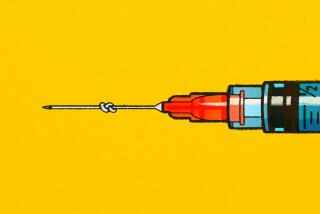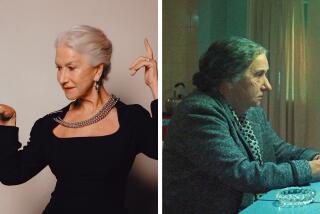Excel Makes Inroads in Market for Prosthetics : Simi Valley Company Creates Realistic Silicon or Plastic Noses, Teeth and Eyes
- Share via
SIMI VALLEY — Plenty of businesses have been started in garages--some great ones such as Apple Computer and some disasters such as Barry Minkow’s ZZZZ Best.
It’s still too early to tell about Excel, the company Kurt Tennyson and Maurice Helland started six years ago in a Simi Valley garage. Excel makes realistic-looking silicon or plastic noses, teeth and eyes used for cosmetic purposes by cancer and accident victims.
Last year Excel broke even on total sales of $50,000, but the future has promise. Excel has moved into a proper office and Tennyson and Helland have quit their full-time jobs at UCLA in hope of building their company into a winner.
Although Excel’s products are exotic, one problem the company must overcome is common to many small businesses: how to compete against much larger companies when you’re short of cash.
Price of Nose Varies
Excel is the smallest of four or five firms that make prosthetic facial devices in Southern California. And while Tennyson and Helland sell a silicon nose for $500, their rivals typically charge $2,000 for essentially the same product.
Most of the difference can be traced to a type of insurance similar to malpractice coverage that allows the prosthesis-maker to deal directly with clients and thus charge more. Excel does not have such insurance.
“The only way to really make it is to deal directly with the public,” said O. Robert Levy, head of a Los Angeles firm that makes prosthetic eyes.
Levy’s company has insurance so that he and his technicians can deal directly with customers and charge retail prices. The optometrist said the company did $500,000 in sales last year and turned a $125,000 profit. Levy said he founded his company in 1946 and counts as one of his longtime customers Sammy Davis Jr., who lost his left eye in an automobile accident in 1954.
Rivals said Excel’s insurance bill might run $25,000 a year, and Tennyson said “right now we don’t have the money it would take to redo the office and pay the insurance premiums.”
Money Problems
It’s a classic small-business Catch-22. To grow, Excel must have more money. But it can’t easily borrow more money until the company is bigger.
So what do Tennyson and Helland do? Keep hustling for new business and hope sales keep growing until they save what they need to expand.
In the meantime, it’s not an easy life. Helland and Tennyson are Excel’s only employees; each works 60 hours a week. Last year they didn’t take any salary, instead using what spare cash the business generated to buy equipment. This year they expect Excel to hit about $100,000 in sales, and the two hope to take home about $15,000 to $20,000 apiece.
Helland, 56, has a Navy pension to augment his income, while Tennyson, 35, has $23,000 in savings in case things get tight. Tennyson’s wife works, earning about $25,000 a year as a dental hygienist.
“She’s holding down the fort this year for us and our two children,” Tennyson said. “We’re not eating out or taking vacations this year.”
New Materials
The prosthetics industry began to grow in the 1950s, when materials such as silicons and vinyl plastics began to be used widely. Every year in California about 3,000 people require facial prosthetics as a result of cancers or accidents, and nationwide the number is 60,000, said John Beumer, chairman of the removable prosthodontics department at UCLA’s School of Dentistry.
Dental technicians such as Helland and Tennyson, medical illustrators and specially trained dentists and oculists--who make artificial eyes--work at private companies and university laboratories, measuring patients and custom-making cosmetic devices.
“One of the reasons we do this is because it’s so rewarding to help people get back into society again,” Helland said.
“You have to have artistic ability to do this kind of work,” said Carole Peretti, a medical illustrator who opened the Center for Prosthetics and Makeup in Hollywood in December and is an Excel rival.
A dentist mails clay-like impressions of the client’s face to Excel, and the two men use it and photographs to create a realistic facsimile of the missing facial part. The process involves creating a wax mold and filling it with silicon. The prosthetic is hardened in a special oven and hand-painted. The whole process can take two days.
Spare Parts
Not surprisingly, it’s a business with some unusual aspects. Tennyson said that the fees for a nose include a spare, which is usually painted a shade darker to mimic a summer tan.
Facial prostheses are attached with glues like rubber cement and are removed daily, Tennyson said, by rinsing the plastic body part with soap and water or applying something like paint thinner. A glue that is not water-soluble was developed for people in rainy climates or for those who sweat profusely and are afraid their nose or ear will fall off.
Tennyson tells a story about a patient whose artificial ear became discolored a few months after he received it. No one could figure out why--usually it takes about a year before yellowing. Then the man’s wife came up with the answer. The patient would read the newspaper and habitually touch his ear with his ink-stained hand to make sure the ear was in place.
Helland and Tennyson met 12 years ago at UCLA, where both fit clients for facial prostheses and also taught dentists how to make the devices. They earned about $30,000 annually, Tennyson said.
Broke Even
They started their company with $4,000 in 1983 in Helland’s garage. Working nights and weekends, they broke even the first year. As the business grew--entirely by word of mouth--they were able to purchase about $75,000 worth of used equipment, such as special lathes and ovens.
Helland retired from UCLA in the spring of 1988, and Tennyson quit in February to work at Excel full time. “I could tell I was at a standstill at UCLA after I didn’t get a raise for six years,” Tennyson said. “There’s more potential here.”
Excel, which gets orders from about 40 dentists, has a far smaller customer base than its rivals. Levy, for instance, said he makes about 800 eyes per year for patients from around the world. The Peyton Massey Prosthetic Center of West Los Angeles, which has been in business for 35 years, has about 175 clients and did about $500,000 in sales last year, said spokesman Allen Feuerstein.
Making facial prosthetics is highly labor-intensive. Tennyson and Helland often return to the lab after dinner and stay until midnight. Someday they may hire additional technicians, although they said they are concerned the quality of the lab’s work would suffer.
“The biggest risk in this business is job burnout from the long hours,” Tennyson said. “But we’re not burned out yet.”
More to Read
Inside the business of entertainment
The Wide Shot brings you news, analysis and insights on everything from streaming wars to production — and what it all means for the future.
You may occasionally receive promotional content from the Los Angeles Times.










